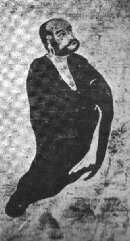 1. Bodhidharma and the Emperor Wu
1. Bodhidharma and the Emperor WuEmperor Wu of China was a very benevolent Buddhist ruler. He built many temples and monasteries, educated many monks, and performed countless philanthropic deeds in the name of Buddhism. He asked the great teacher Bodhidharma, "What merit is there in my good works?" Bodhidharma replied, "None whatsoever." The Emperor then asked, "What is the highest meaning of the Noble Truths?" Bodhidharma answered, "Vast Emptiness, devoid of Nobility." The Emperor then queried, "Who, then, is this confronting me?"
"I do not know," was Bodhidharma's reply.
Since the Emperor did not understand, Bodhidharma left his kingdom. Later, the Emperor related this conversation to an adviser, Prince Shiko. Shiko reprimanded him, saying that Bodhidharma was a great teacher possessed of the highest truth. The Emperor, filled with regret, dispatched a messenger to entreat Bodhidharma to return. But Shiko warned, "Even if all the people in the land went, that one will never return."
*For this Koan, meditate on "I do not know". If you know what is it that is not known, you will see your own Buddha-nature.
2. Seijo's Two Souls
Chokan had a very beautiful daughter named Seijo. He also had a handsome young cousin named Ochu. Joking, he would often comment that they would make a fine married couple. Actually, he planned to give his daughter in marriage to another man. But young Seijo and Ochu took him seriously; they fell in love and thought themselves engaged. One day Chokan announced Seijo's betrothal to the other man. In rage and despair, Ochu left by boat. After several days journey, much to his astonishment and joy he discovered that Seijo was on the boat with him!
They went to a nearby city where they lived for several years and had two children. But Seijo could not forget her father; so Ochu decided to go back with her and ask the father's forgiveness and blessing. When they arrived, he left Seijo on the boat and went to the father's house. he humbly apologized to the father for taking his daughter away and asked forgiveness for them both.
"What is the meaning of all this madness?" the father exclaimed. Then he related that after Ochu had left, many years ago, his daughter Seijo had fallen ill and had lain comatose in bed since. Ochu assured him that he was mistaken, and, in proof, he brought Seijo from the boat. When she entered, the Seijo lying ill in bed rose to meet her, and the two became one. Zen Master Goso, referrring to the legend, observed, "Seijo had two souls, one always sick at home and the other in the city, a married woman with two children. Which was the true soul?"
*For this Koan, meditate on which was Seijo's true soul.
3. Ganto's Two Meals
Kisan paid a visit to Ganto, who was living in quiet seclusion, and asked, "Brother, are you getting two meals regularly?" "The fourth son of the Cho family supports me, and I am very much obliged to him," said Ganto. "If you do not do your part well, you will be born as an ox in the next life and will have to repay him for what you owed him in this life," Kisan cautioned.
Ganto put his fists on his forehead but said nothing. "If you mean horns," Kisan said, "you must stick out your fingers on top of your head." But before he finished speaking, Ganto shouted, "Hey!" Kisan did not understand his meaning and said, "If you know something deeper, why don't you explain it to me?" Ganto hissed at him and said, "You have been studying Buddhism for thirty years, as I have, and you are still wandering around. I have nothing to do with you. Just get out." And with these words he shut the door in Kisan's face.
The fourth son of the Cho family happened to be passing by and, out of pity, took Kisan to his home. "Thirty years ago we were close friends," Kisan said sorrowfully, "but now he has attained something higher than I have and will not impart it to me."
That night Kisan could not sleep. He got up and went to Ganto's house. "Brother," he implored, "please be kind and preach the Dharma for me." Ganto opened the door and disclosed the teaching. The next morning Kisan returned home, happy with attainment.
*For this Koan, meditate on what are the 2 meals.
4. Everything is Best
One day Banzan was walking through a market. He overheard a customer say to the butcher, "Give me the best piece of meat you have." "Everything in my shop is the best," replied the butcher. "You can not find any piece of meat that is not the best." At these words, Banzan was enlightened.
*For this Koan, meditate on what is the best meat.
5. Where to Meet after Death
Dogo paid a visit to his sick fellow monk, Ungan. "Where can I see you again if you die and leave only your corpse?" Dogo asked. "I will meet you where nothing dies," Ungan replied. Dogo criticized his response saying, "What you should have said is that there is no place where nothing is born and nothing dies and so we need not see each other at all."
*For this Koan, meditate on what is the place where nothing is born or dies.
No comments:
Post a Comment